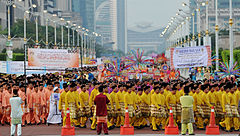Milad un Nabi
| Mawlid | |
|---|---|

Malaysian Sunni Muslims in a Mawlid procession in capital Putrajaya, 2013.
|
|
| Also called | Eid al-Mawlid an-Nabawī (المولد النبوي), Havliye, Donba, Gani |
| Observed by | Adherents of mainstream Sunni Islam, Shia Islam and various other Islamic denominations except a few such as Wahhabism/Salafism etc. |
| Type | Islamic, cultural |
| Significance | Traditional commemoration of the birth of Muhammad |
| Observances | fasting, public processions, religious singing, family and other social gatherings, decoration of streets and homes |
| Date | 12 Rabi' al-awwal (Sunni Islam), 17 Rabi' al-awwal (Shia Islam) |
| 2016 date | from sunset to sunset: 11–12 December (Sunnism) 16–17 December (Shi'ism) |
| Frequency | Annual/lunar (every 12 lunations) |
Mawlid (Arabic: مَولِد النَّبِي mawlidu n-nabiyyi, "Birth of the Prophet", sometimes simply called in colloquial Arabic مولد mawlid, mevlid, mevlit, mulud among other vernacular pronunciations; sometimes ميلاد mīlād) is the observance of the birthday of the Islamic prophet Muhammad which is celebrated in Rabi' al-awwal, the third month in the Islamic calendar. 12 Rabi' al-awwal is the accepted date among most of the Sunni scholars, while Shi'a scholars regard 17 Rabi' al-awwal as the accepted date. This seven days period, i.e. 12–17 Rabi' al-awwal, is assigned by Islamic Republic of Iran as the unity week.
The origin of Mawlid observance reportedly dates back to the period of the early four Rashidun Caliphs of Islam. The Ottomans declared it an official holiday in 1588. The term Mawlid is also used in some parts of the world, such as Egypt, as a generic term for the birthday celebrations of other historical religious figures such as Sufi saints.
Most denominations of Islam approve of the commemoration of Muhammad's birthday; however, some denominations including Wahhabism/Salafism, Deobandism and the Ahmadiyya disapprove its commemoration, considering it an unnecessary religious innovation (bid'ah or bidat).Mawlid is recognized as a national holiday in most of the Muslim-majority countries of the world except Saudi Arabia and Qatar which are officially Wahhabi/Salafi. Shaykh Faraz Rabbani states that the Mawlid is generally approved of across the four Islamic schools of law and by mainstream Islamic scholarship.
...
Wikipedia
